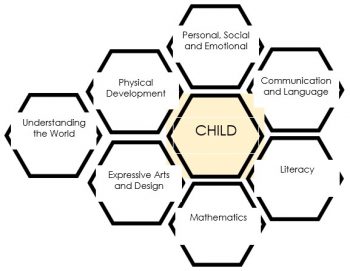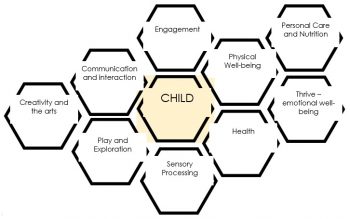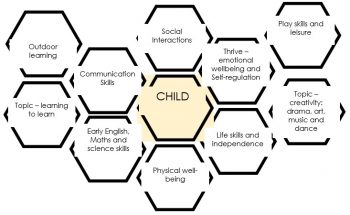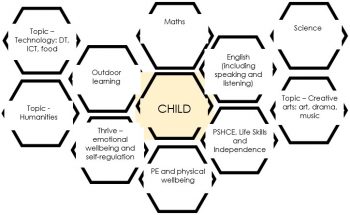Curriculum Organisation
Children are grouped in classes based on the provision that they need, along with peers working on a similar curriculum.
Pupil progress will be at different rates with significant variations in individual achievement. All children will be able to follow a curriculum which enables them to achieve their maximum potential. The curriculum supports children to develop concepts, attitudes, skills and knowledge essential to them in their everyday lives, within a richness of experience, with breadth and balance.
As well as ensuring our children have engaging and relevant learning opportunities, time is given for physical management, nutrition, personal care, any medical requirements, independence skills and social time with peers. We know that it is vital that our children are engaged, regulated, physically health, pain free and happy in order to develop and secure new skills.
All of this is done in a P = Playful, L = Loving, A = Accepting, C = Curious and E = Empathic atmosphere for emotional learning.
EYFS
The EYFS is based upon four principles:
- A Unique child – developing resilient, capable, confident and self-assured individuals.
- Positive relationships – supporting the children in becoming strong and independent.
- Enabling environments – where opportunities and experiences respond to the individual needs of the child by developing a strong partnership between practitioners, parents/carers and the child.
- Learning and developing – an acknowledgement that children learn in different ways and at different rates
Practitioners consider the individual needs, interests, and development of each child in their class, and use this information to plan a challenging and enjoyable experience for each child in all areas of learning and development. Practitioners ensure a strong foundation for children’s development in the three prime areas. The specific areas of learning provide children with a broad curriculum and with opportunities to strengthen and apply the prime areas of learning. This is particularly important in developing language and extending vocabulary.
| Areas of learning and development | Birth to 5 matters aspects |
| Prime areas: | |
| Personal, social and emotional
|
Making relationships |
| Sense of self | |
| Understanding feelings | |
| Physical development
|
Moving and handling |
| Health and self-care | |
| Communication and language
|
Listening and attention |
| Understanding | |
| Speaking | |
| Specific areas: | |
| Literacy | Reading |
| Writing | |
| Mathematics | Mathematics |
| Understanding the world | People and communities |
| The world | |
| Technology | |
| Expressive arts and design | Creating with materials |
| Being imaginative and expressive |
The Early Years Foundation Stage (EYFS) applies to children from birth to the end of the Reception year. In partnership with parents and carers, and a range of other professionals, we enable the children to begin the process of becoming active learners. In line with the rest of Hadrian school, we use a range of tools to help our EYFS children make progress, for example they will have access to an appropriate curriculum that includes:
- Development Matters/EYFS Framework
- Outdoor learning
- Hydrotherapy
- Rebound Therapy
- Sensory
- Music Therapy
- Massage
- OT and Physiotherapy
- Body Awareness
- Jabadao (Developmental Movement)
- Communication Groups (literacy/numeracy/sensory)
- Literacy and Numeracy interventions including ‘letters and sounds’/Numicon
- Total communication approach (Makaton/objects of reference/picture symbols)
The EYFS curriculum will be flexible and will involve opportunities to develop children’s interests, enabling ‘child lead learning’ to take place. We will prioritise ‘learning to learn’ and the acquisition of life skills within the curriculum for our children.
Sensory and Therapeutic Curriculum
Explore and Discover Curriculum
Subject Specific Curriculum
English
English within Hadrian School comprises of many elements and is taught both explicitly, through structured English sessions such as phonics or reading, and through being incorporated within other subjects to enhance and enrich the curriculum. Through our English curriculum, we are committed to:
- Raising attainment for pupils in English through adopting a range of strategies designed to suit the needs of the learner.
- Enabling our pupils to write and read as confidently, fluently, accurately and with as much understanding as possible.
- Employing consistent approaches to the planning, teaching and learning and assessment (Pre Key Stage Standards and SCART) of reading and writing throughout the school.
- Providing a curriculum which is inspiring, engaging, motivating and relevant with breadth of study and appropriate resources.
- Ensuring that achievement is celebrated and valued in English across school.
- Ensuring that progress is easily trackable.
- Using a consistent approach in planning, teaching and learning and assessing in English.
Maths
In Hadrian School the teaching and learning of mathematical skills takes place, not only during structured Maths lessons, but throughout the day, across all areas of the curriculum and in different locations and environments. For many children the provision of planned and purposeful play is essential with a balance of child and adult initiated play. Many children also have opportunities to apply and develop their mathematical skills in the local community and further afield e.g. a combined schools sports event.
In Maths, children extend sensory experiences, social experiences, developing early learning experiences. Pupils are given opportunities to:
- Explore their environment to get first-hand experience of differences in space, shape and quantity changes and time.
- Learn through supported repetition and repeated experiences.
- Develop an awareness of simple patterns and relationships.
- Use this awareness to anticipate and predict within routines or familiar situations.
- Develop ways of communicating this awareness and, where appropriate, experience or start to acquire common mathematical language (including number words) in familiar or everyday practical contexts.
- Take part in activities that involve counting.
Beyond this, children apply knowledge to their activities and use early mathematical skills in practical contexts. Pupils are given opportunities to:
- Develop their ability to explore and change space shape quantities.
- Use their awareness of space, shape and quantity in responding to the environment.
- Be aware of similarities and differences in shape, space and aspects of comparison and measurement.
- Match and sort, selecting their own criteria.
- Participate in learning to count and use counting to find out ‘how many?’
- Participate in collecting and separating to add and subtract in practical contexts.
- Experience representations of mathematical information in various forms e.g. objects, tokens
- Experience the use of marks, symbols and numerals to represent amounts.
- Be encouraged to make simple deductions.
The delivery of a broad and balanced Maths curriculum at Hadrian School has an impact on the following:
- Developing pupils’ awareness of events and actions in the immediate and wider environment as they learn to recognise changes in pattern, quantity and space.
- Developing their ability to anticipate and predict change in routines and daily life.
- Extending their understanding of experiences by being able to visualise, compare and estimate
- Developing sensory awareness and perception skills
- Developing and applying ICT skills
- Being able to apply understanding and use of number skills, including mental calculation, within a variety of contexts and relevant situations
- Building confidence, raising self- esteem and learning to persevere when challenged
- Being able to reflect and evaluate their work and talk about how they can improve their learning
- Developing social skills including being able to work cooperatively with others, contribute to discussions and appreciate the needs and opinions of others.
- Developing problem solving skills that lead to making choices, taking decisions and gaining control in different situations
- Developing verbal, non-verbal and augmentative means of communication
- Developing and using thinking skills:
- Early skills – sensory awareness, understanding cause and effect, remembering, anticipating
- Information-processing skills – to collect relevant information, to sort, classify, sequence, compare and contrast
- Reasoning skills – to explain their actions and opinions, to communicate what they think and to make decisions informed by reason or evidence
- Enquiry skills – to ask relevant questions, to recognise problems, to plan what to do, to predict outcomes and improve ideas
- Creative thinking skills – to express ideas, to use imagination and to look for alternative outcomes
Science
Hadrian School Principles of Science Teaching and Learning:
- Pupils are highly engaged and experience moments of ‘awe and wonder’
- Learning is personalised to meet the needs of individual pupils
- Previous learning is built upon and new learning is evident
- Pupils are encouraged to be curious, explore, play, make choices, ask and answer questions and make discoveries
- Links to other areas of the curriculum are evident
- Motivating resources are used including the use of our outdoor environment
Outdoor Learning
We value the contribution Outdoor Learning brings to our children’s education. We promote Outdoor Learning at every available opportunity and aim to teach a minimum of a day’s education in our school grounds and outdoor learning areas per week.
Our substantial grounds include a Wildlife Garden, Yurt, Mud Kitchen, Water Wall, a Secret Garden, a Caterpillar Garden, bespoke teaching areas and adventure playground.
The Creative Curriculum
Our creative curriculum has termly topics for all children who are not on a Sensory and Therapeutic Curriculum. We also have a calendar of special and inspiring events and activities throughout the year that all classes can access.
Each topic can cover art, drama, DT, history, geography, IT, music, outdoor learning and some parts of English (writing, speaking and listening). There are times when we need to have some standalone sessions for all or some parts of Maths, English (reading), Science, PE and PSHCE.
Our creative topic approach results in:
- Creative learning opportunities that are bespoke to the individual needs of the children
- Immersive awe and wonder experiences for our children
- Teachers develop learning opportunities that are designed to explicitly support children to reach their PLP outcomes.
- Children have opportunities for skills to be rehearsed, secured and generalised
- A balance between direct teaching and child-led learning
- Teachers have the freedom based on the needs of their children to arrange their timetable as they need. Children have 4 sessions of Maths and English per week – either as standalone or as part of the topic work.
- Teachers develop termly creative topic plans and timetables. We share them collaboratively to gain from each other’s knowledge and experience. Topics are developed and agreed on by teachers for each pair of year groups. There are benefits for children of having fixed topics so that planning and resources can be established and built upon over years.
- Enriching out of school visits and visitors to school.
- Time for other exciting alternative learning experiences e.g. special days, celebrations, visitors, whole school events and projects
- RE is covered through daily acts of worship in circle times, lunchtimes and annual religious and cultural whole school festivals. Christmas (Christian), Easter (Christian), Eid (Muslim), Hanukkah (Jewish), Diwali (Hindu, Jain, Sikh), Chinese New Year, Holi (Hindu)
The topics chosen are:
- Bold – big, broad, generative topics that are full of possibility
- Relevant – topics to be contextualised, culturally and geographically relevant and purposeful
- Aspirational – high expectations of learning and outcomes
- Varied – give the children the opportunity to work in different ways
- Engaging – children to be inspired, engaged and immersed in their learning
Our learners on the Explore and Discover Curriculum focus on PLP outcomes, as agreed as the priorities for each child. This leads to increased time spent focused on PLP outcomes and therefore an increase in achievement of them. They get broad and balanced experiences and activities through the topics in which to rehearse and develop their skills.
For classes of children who are subject specific leaners, they have subject specific knowledge and skills outcomes taught alongside their PLP outcomes to ensure they are challenged and that their curriculum is ambitious and relevant. The relevant, appropriate subject specific outcomes are selected by the teacher from the SCART subject outcomes.
Topics are given to pairs of year groups then children don’t repeat the same topic if they stay in the same class for two years.
Therapies
Some of our children have therapeutic needs, which are central to their learning and wellbeing. Responses to these needs are an integral part of the curriculum. The therapies, which may play an essential role in meeting the priority needs of pupils, are wide ranging and help to enhance the quality of individual pupils’ lives in many different ways. Examples include:
- supporting the accurate identification and assessment of individual needs in the area of language and communication
- promoting improved access to learning opportunities through optimum positioning
- encouraging the development, refinement or maintenance of skills in independent mobility
- helping pupils to maintain an optimum physical state in terms of posture, muscle tone and movement
- supporting the management of eating and drinking
- enhancing the pupils’ potential to learn by relaxation and improved mental states
- providing palliative treatments for painful or degenerative conditions in order to ensure health and well-being
- promoting autonomy and independence through the use of specialist aids and equipment
- enhancing pupils’ self esteem
Some therapists work as part of a multidisciplinary team and elements of therapeutic programmes are integrated successfully into classroom activities alongside educational targets. Other children, however, need ongoing, intensive work on individual therapy programmes in timetabled sessions and in dedicated therapeutic environments.
A pupil’s entitlement to receive therapy may need to be ensured through the EHCP. Appropriate outcomes are then incorporated into the pupil’s PLP.
Therapists may delegate the implementation of aspects of their programmes to school staff and to pupils and their families. Where non-therapists undertake parts of therapeutic programmes, therapists:
- offer advice and training for staff, pupils and families on the techniques and approaches to be used
- monitor the quality of the work being undertaken and provide appropriate and effective support





